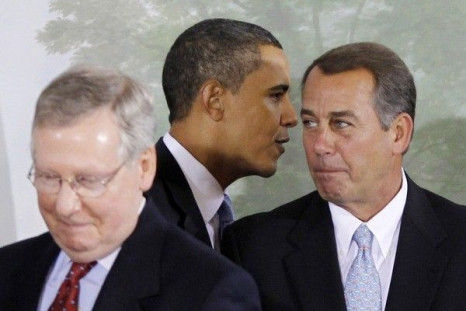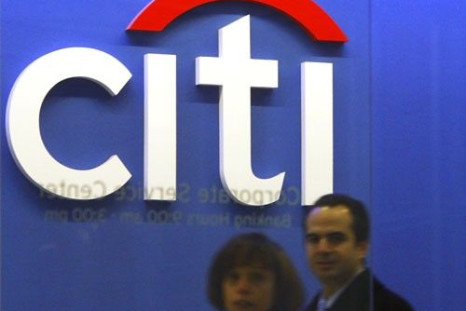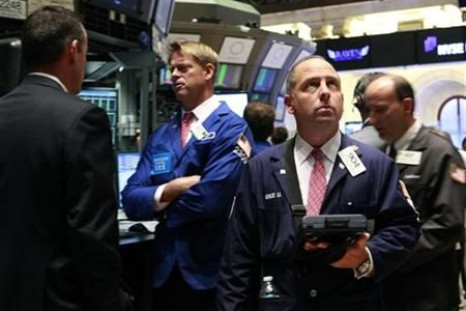Why there will be no Treasury crisis
There are plenty of concerns surrounding U.S. Treasuries, yet a Treasury crisis doesn't seem to be happening.
Why China avoided a balance sheet recession: Koo
Why did China avoid a steep recession and bounced back relatively quickly? The answer is its massive fiscal stimulus, according to Richard Koo.
Obama's tax cut compromise threatened by House Democrats
House Democrats are rebelling against Obama's tax cut compromise with the Republicans. On Wednesday, they essentially rejected it in its current form by passing a non-binding resolution to block it from coming to the House floor.
Chinese YouTube Youku's IPO draws eye-popping demand
New shares of Chinese online video broadcasting company Youku (NYSE:YOKU) are selling like it's 1999.
Why are Chinese banks going public now?
Chinese banks are going public. But why are these banks raising money, and are they good investments?
Interview: Siemens CEO Peter Löscher on green energy
IBTimes speaks to Siemens CEO Peter Löscher about the future of renewable energy, the megatrends affecting it, and how his company is positioning itself in this industry.
Interview: Mesirow CEO James Tyree on navigating the post-crisis investment landscape
James Tyree, CEO of Mesirow Financial, speaks to IBTimes about how his firm is navigating the challenges of the post-crisis financial world.
South Korea tries to drum up foreign investments
The government of South Korea is trying to drum up foreign direct investments through free economic zones (FEZ), or areas that offer financial incentives for foreign investments.
All signs point to higher inflation in China
Domestic monetary policy, monetary policy abroad, wages, and the cost of essential commodities all point to higher inflation in China, according to virtually every single school of economic thought.
Opinion: Trouble for gold bulls?
Gold just fell on bullish news, which is arguably a very bearish sign for the yellow metal.
What's still wrong with the global economy : UN
The United Nations explains in a report why the fragile and uneven global recovery that started in 2009 began to decelerate in the middle of 2010 and lists the myriad of problems that still plagues the economy
Treasury yields to rise in 2011: Morgan Stanley
Two Morgan Stanley economists predict that U.S. 10-year Treasury yields will rise to about 3.75 percent by the end of 2011 because of accelerated economic growth.
Obama tax deal: more jobs, higher growth, higher deficits
Tax cuts and increased government spending designed to support and grow the economy are fiscal stimulus measures. President Obama's compromise with the Republicans will give America both.
EU to conduct new stress tests for banks in 2011
Olli Rehn said the European Union will conduct a second round of stress test for banks in February 2011.
Treasury will try to unload Citigroup shares through IPO
The U.S. Treasury Department said it will attempt to dispose of its remaining common equity stake in Citigroup through an initial public offering (IPO).
U.S. monetary policy shocks drive global stock prices: IMF study
A study by IMF economists Luc Laeven and Hui Tong found that U.S. monetary policy shocks drive global stock market prices.
Plenty of praise in the U.S. for South Korean FTA
Plenty of U.S. organizations are praising the newly-negotiated U.S.-Korea Free Trade Agreement, which is awaiting approval from lawmakers of both countries.
Top Chinese official doubts country's economic data: WikiLeaks
Wikileaks revealed that Li Keqiang, a senior Chinese politician with many economic-related duties, doubts the country's economic data.
Bernanke takes shots at foreign critics of QE2
In a CBS interview, Federal Reserve Chairman Ben Bernanke took shots at foreign critics who openly bashed QE2 in the days leading up to the November 11 G20 Summit.
Fed could launch QE3: Bernanke
During a CBS interview, Federal Reserve Chairman Ben Bernanke did not rule out the possibility of more asset purchases, meaning a third round of quantitative easing (QE3) is possible.
Why the Irish bailout failed to calm the markets
The Irish bailout package, so far, has not achieved its two main goals. It failed to restore private investors' appetite for Irish government bonds and stop the debt crisis from spreading to other countries. What went wrong?
China to tighten monetary policy in 2011
China will shift monetary policy from the current stance of relatively loose to prudent next year, reported the country's state-controlled media on Friday.
Bad jobs data will push Congress to extend benefits: economist
The poor jobs data will push Congress to extend both the unemployment insurance benefits and all of the Bush tax cuts, according to Diane Swonk, chief economist at Mesirow Financial.
Jobs data shocks to the down side, what happened to the mini-rebound?
November's jobs data was shockingly bad and casts doubt on the optimism generated by upbeat economic reports from recent weeks.
Why U.S. stocks can go up in 2011
The health of the American economy and the level of accommodation in monetary policy are the two most important factors that influence U.S. stock price movements. In 2011, it seems U.S. equities may get support both.
Interview: Srinivas Thiruvadanthai on why this recession is different
In an Interview with IBTimes, Srinivas Thiruvadanthai explores the concept of balance sheet recessions and other factors that make the Great Recession so severe.
Forex broker FXCM goes public with IPO
FXCM (NYSE:FXCM) raised about $211 million from its initial public offering (IPO) of 15,060,000 shares, priced at $14 per share -- the company now has a total market value of about $1 billion.
Why did Germany and France spook the euro?
France and Germany, the two leading countries of the euro zone, may have intentionally engineered a competitive currency devaluation by pushing private investors to share the burden of future sovereign bailouts.
Why jobs are going overseas
Decades ago, the United States had a huge competitive edge over the rest of the world. However, that advantage is slipping away and so are American jobs.
Financialization of commodities poses threat to real economy
The financialization of commodities threatens to divert capital from economically useful purposes and use it instead to drive up the cost of essential commodities for end users.



































